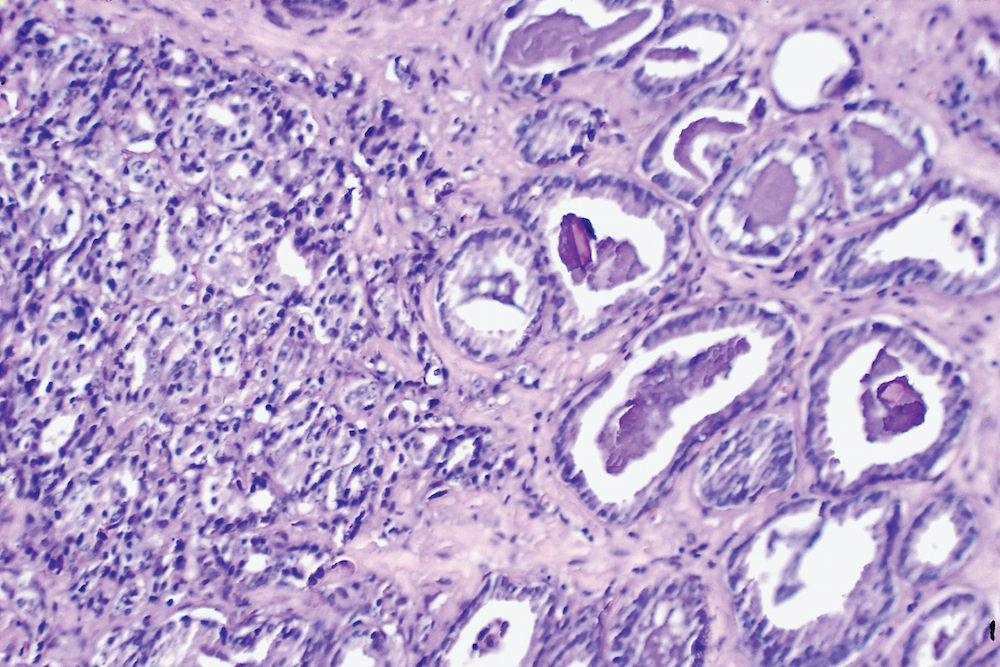- Researchers have discovered that the protein DLL3, which is expressed in a type of aggressive prostate cancer, could be “an attractive therapeutic target.”
- The scientists undertook the study because they noted that castration-resistant small cell neuroendocrine prostate cancer has similarities to small cell lung cancer, whose cells often express DLL3 on their surface.
Medically reviewed by Himisha Beltran, MD
Prostate cancer, when diagnosed early, can be a very treatable disease. Even advanced prostate cancer has treatment options. But some advanced, metastatic prostate cancers become resistant to standard therapies by shapeshifting into a different type of cancer, called small cell neuroendocrine prostate cancer. These neuroendocrine tumors tend to be aggressive and respond poorly to treatment.
Scientists now may have found a new approach to treating these resistant cancers. Led by Himisha Beltran, MD, of Dana-Farber, a research team discovered that the protein DLL3 is expressed in neuroendocrine prostate cancers — but not in localized tumors or benign tissue.
The scientists undertook the study because they noted that castration-resistant small cell neuroendocrine prostate cancer has similarities to small cell lung cancer, whose cells often express DLL3 on their surface. A designer drug known as rovalpituzumab tesirine had already been developed that targets DLL3 in small cell lung cancer. Other drug approaches to target DLL3 are also in development. Targeting DLL3 may be useful in treating men with neuroendocrine prostate cancer whose tumors exhibit DLL3 expression, the researchers say in a report in Science Translational Medicine.
Finding a target
In their study, Beltran and her collaborators found that DLL3 is expressed in a subset of advanced metastatic prostate cancer, and not in benign tissues, “making DLL3 an attractive therapeutic target.”

They demonstrated that in the laboratory and in animal models with prostate tumors, this antibody targeting DLL3 conjugated to a cytotoxic agent dramatically inhibited tumor growth. They also reported treatment of a 71-year-old man who developed metastatic cancer after removal of his prostate. He was enrolled in a Phase 1 trial of rovalpituzumab tesirine after the disease progressed despite treatment with standard therapies. Following treatment with the experimental drug, his metastatic lesions shrank, and no new lesions were seen, the scientists said.
“Overall our study provides insights regarding DLL3 expression in metastatic prostate cancer and a rational for further development of DLL3-targeted therapeutics for a subset of patients with advanced prostate cancer,” the authors said.

Does this therapy work for post prostatectomy patients who have also had radiation and chemotherapeutic agents? Currently taking hormonal therapy due to rise in PSA despite all of these methods.
Thank you for reading and apologies for the delay in response. Due to the high volume of comments we receive, we are usually unable to respond to each person individually. If you have a specific medical question related to this blog post, we would recommend talking to your doctor or other care provider. We’ve also gathered answers to some of the more frequent questions below:
-For more information on a particular type of cancer or the latest updates we have available, please visit our website (https://www.dana-farber.org/) or search our blog by clicking the magnifying glass at the top of our homepage: https://blog.dana-farber.org/insight/
-For information on whether you would be eligible for a certain treatment, please visit our website for more information on how to make an appointment or get an online second opinion: https://www.dana-farber.org/appointments-and-second-opinions/
-For information on clinical trials available at Dana-Farber and elsewhere, please visit the Dana-Farber database: https://www.dana-farber.org/research/clinical-trials/find-a-clinical-trial/. For clinical trials outside of Dana-Farber: http://www.clinicaltrials.gov.
Wishing you all the best,
Dana-Farber Insight team